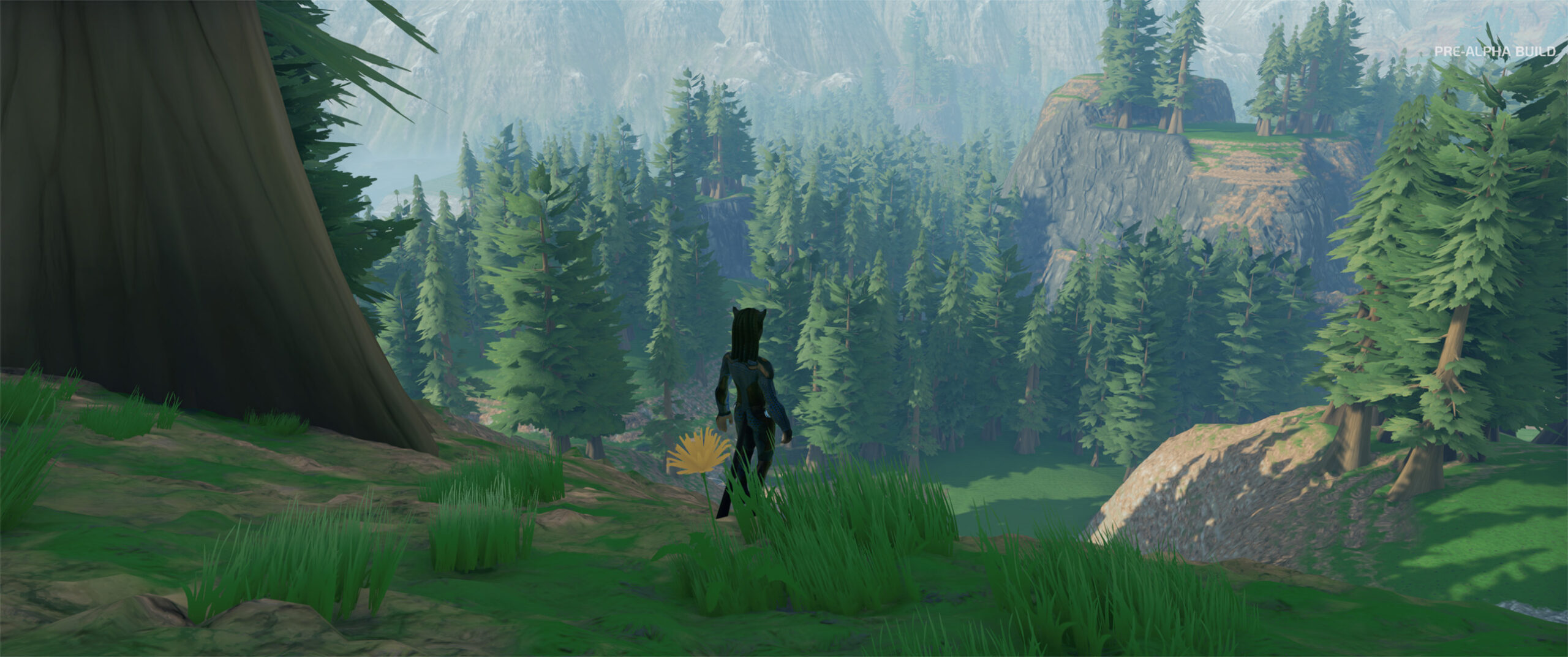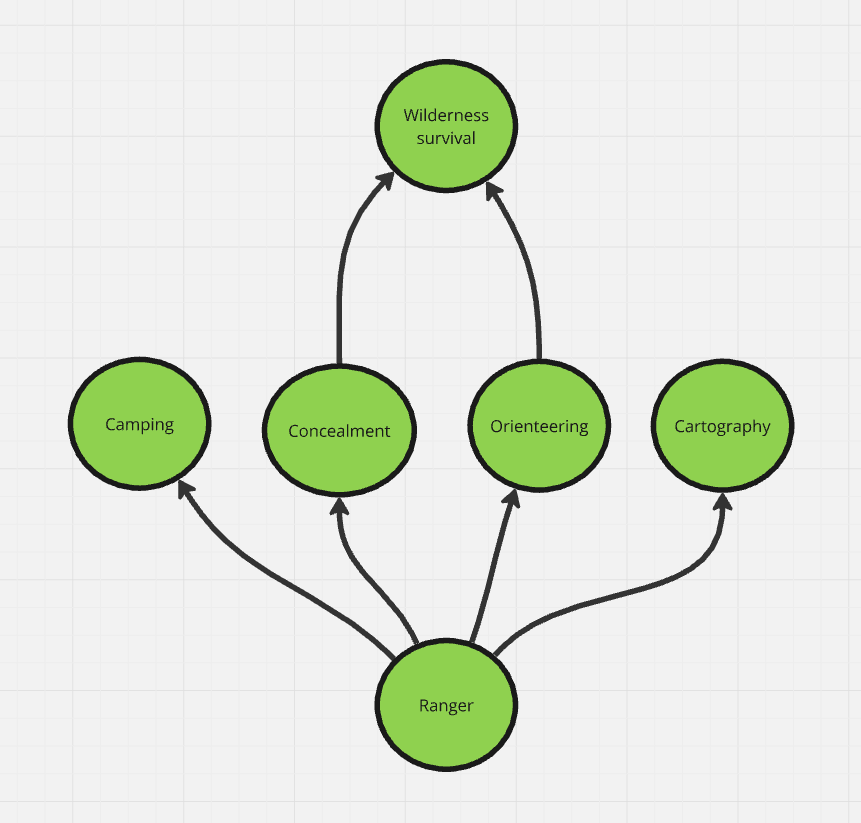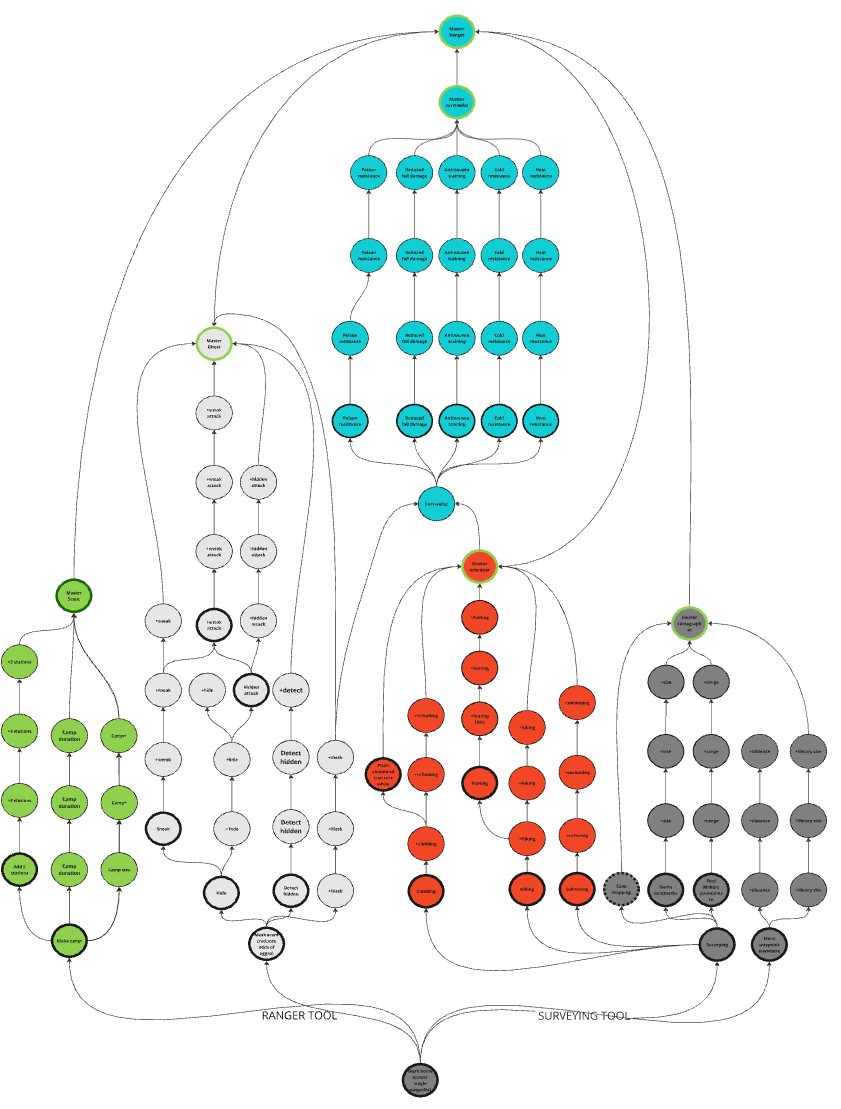
If you read our last blog post, you heard about the features we plan to test this weekend.
To date, we have been unlocking only specific features in each test, and trying them out in isolation, rather than letting testers play with all the systems we have done work on. Probably most notably, testers have had combat used on them, but they haven’t been able to really fight back with weapons yet.
That’s because until now, we have been doing mostly scalability and stability testing. Testing features in isolation lets us measure their performance more accurately, and reduces the number of variables as we isolate issues. This lets us iterate on them as quickly as possible.
But now that we have a good sense of what to tackle on the performance side, we’re ready to start letting players try out gameplay features! This time around, we are going to have more than one game system turned on, so that we can start to test out how they interlock.
In Stars Reach, each gameplay system is dependent on others in various ways, so we have to plan carefully what we turn on at each test.
As one example of that, crafting was mostly not available in the earlier tests, but we did give players the Paver tool. Normally, that would have required skills from the Civil Engineering profession. To enable the test of world manipulation without dragging in all of crafting, we just made it so that you didn’t need to actually craft paving stones or pavement, and instead just spawned the pavement directly in the world. The paving also all came from just one material, even though in the actual game you’d need to harvest the right materials to make a given pavement type.
This time, testers are going to try out a pretty important pair of systems, one oriented around exploration, and the other, excitingly, combat.
Being a Ranger
Remember, Stars Reach does not have classes. Instead, you can start learning any given skill tree, which we call a profession. Sometimes, one profession unlocks another. This means changing our mindset a little bit when we design special abilities.
As developers, we might have a natural inclination to say “learning knives plays well with stealth abilities, so I’m going to put some stealth powers in the knives skill tree.” In a system like ours, it’s better to think of stealth as a profession in its own right, that might pair up with knives, but also might pair up with mining, botany, or xenobiology because players want to avoid combat while hunting for rare samples.
We end up grouping together these “ways to play” into the professions, and testers are going to get to try out two parts of the overall Ranger tree in the test this weekend.
Rangering is big! It’s actually made up of five separate professions arranged like this diagram. Each of these bubbles specializes into different activities.

The base skill to start out as a Ranger offers up just one ability: marking waypoints. This is a basic navigation aid that helps you navigate the world. You have a datapad where you can collect these waypoints, and eventually trade them with others.
From that basic ability, you then branch out.
- If you want to keep exploring what is possible with waypoints, you will want to head toward surveying and cartography. You can learn how to have more and more waypoints, how to set them from a distance, how to collect survey points in the world and craft planetary maps, and more. In Stars Reach, you do not have a minimap until you make one, or obtain one from someone who has crafted one!
- Orienteering is more about learning to hike and navigate. Until now, everyone has had the ability to fly with the gravmesh, and to use grappling. Everyone has been slowed down the same amount by slopes and everyone was equally good at climbing sheer cliffs. This profession is all about unlocking these things and about getting better at them. Hanging on a cliff is going to cost stamina, until you learn how to use pitons, for example.
- Camping is about the ability to create forward bases. In SR, when you die, you pop back to the last save point – a ReLife Station. Rangers who know camping can create these camps and they automatically come with a ReLife Station. Otherwise, you’ll be rewinding back to the start point on the planet. Camps also can have crafting stations and defenses, and they count as a “safe area” for the purposes of healing wounds and using entertainment skills.
- Being sneaky is fun, of course. Learning how to mask your scent from roving creatures, how to hide and sneak about, and even engage in sneak attacks for extra damage regardless of which weapon you use – these are all the province of the Concealment profession.
- Lastly, there’s an advanced profession for truly hardcore explorers. Someone adept at Wilderness Survival can train building up heat and cold resistances for extreme weather and climates, can learn how to resist poisons, and so on.
Enough professions, what about skills?
Even this diagram does not show the systems in real detail. You don’t need to master both Concealment and Orienteering to unlock Wilderness Survival. Professions can be unlocked and branch off midway through a tree.
In fact, even though I am about to share what the trees currently look like with you here, I’ll warn you that we expect to add, drop, and rearrange skills from these as a result of testing. Our skill system is very data-driven and it’s easy for us to do that, so we will take advantage of that capability to keep iterating! So don’t rely on this diagram much!
Some things you might notice about this: bolded circles unlock an ability, like a new special move, or a new passive ability. Ones with the thinner ring are generally about making stats on the ability better. So once you unlock camping, you can make camps of larger size or duration by earning your way further up those progression tracks. We’ve currently settled on around three upgrade tiers as a number that felt good in terms of each new box feeling really consequential.
These trees can also crosslink into other professions. And dotted ones are ones that we aren’t quite ready to talk about or promise yet. Lastly, there are master skills that “sum up” a portion of the tree and can grant titles to players.
In this upcoming test
Players in the next test will only be playing with camping and some amount of surveying. And surveying is not all of the Cartography tree this time. We’re still keeping to the plan of unlocking features a bit at a time. The goal is for each player to try mapping the planet – no sharing of survey points yet. If you had guessed by now that this test is also about evaluating Exploration as a playstyle of its own, you’re right! That’s exactly what we hope to do here.
Players will notice that some of the abilities they’ve gotten used to seeing on other tools have moved around. Being able to clearcut underbrush like a machete, use a low-powered flamethrower, and freeze a path across liquid or hot terrain are things that a Ranger needs to do; previously, some of this capability was on a generic Agitator tool. Our goal is that abilities like that fall into the professions where they make sense. You won’t find the flamethrower melting any rock, for example. It’s just not that hot.
Camping enters the picture because you will find you probably want camps in order to succeed at mapping the planet. Get used to dying, because the creatures in this test are aggressive and fairly tough. Most of the camping skills are present.
Similarly, in this test we are going to let players experience combat. Combat has plenty of work left to do on it, especially around client prediction and networking. But this test is all about mapping a dangerous planet. We figured, you need a chance to fight back. Please don’t judge this as the final form of combat – though it should give you a decent taste of the action-oriented arcadey feel we are going for.
All in all, this should feel like “a game” more than previous tests. You have a clear goal: map the world. The world is resisting. Can’t wait to see how it goes!
Want to help shape the future of Stars Reach? Register now to join our playtest pool! While signing up doesn’t guarantee an invite to the next playtest, you’ll be in the queue for future opportunities to experience new features and gameplay. Be among the first to explore, fight, and influence the game’s direction. [Sign up here]!



